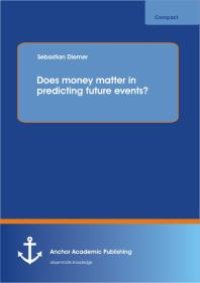
Ebook: Does money matter in predicting future events?
Author: Sebastian Diemer
- Tags: Monetary policy -- Mathematical models., Investments -- Germany., BUS000000, BUS000000, BUS045000
- Year: 2013
- Publisher: Diplomica Verlag
- City: Hamburg, GERMANY
- Edition: 1
- Language: English
- pdf
Prediction markets are online trading platforms where contracts on future events are traded with payoffs being exclusively linked to event occurrence. Scientific research has shown that market prices of such contracts imply high forecasting accuracy through effective information aggregation of dispersed knowledge. This phenomenon is related to incentives for truthful aggregation in the form of real-money or play-money rewards. The question whether real- or play-money incentives enhance higher relative forecast accuracy has been addressed by previous works with diverse findings. The current state of empirical research in his field is subject to two inherent deficiencies. First, inter-market studies suffer from market disparities and differences in the definition of underlying events. Comparisons between two different platforms (one for play-money contracts, one for real-money contracts) are potentially biased by different trading behaviour. Second, the majority of studies are based upon identical datasets of market platforms (IOWA stock exchange, Tradesports/Intrade, NewsFutures). Auszug aus dem Text Text Sample: Chapter 2.2, Other Factors With Influence on Forecasting Accuracy: Luckner (2008) discusses relevant studies based on various online platforms. Berg et al. (2000) consolidate findings of empirical studies on the IOWA prediction market, a prediction platform on political elections which has been operating since 1988. The study is limited to political, indexed contracts which pay off $1 for each per cent of votes or allocated seats a specific political party achieves in US or foreign elections. The dataset included 5 markets for presidential elections, 14 markets for other elections and 30 markets for non-US elections. A total of 237 predictions in 49 markets generated average forecast errors of 0.0137 for US elections, 0.043 for other US elections and 0.012 for non-US elections. The significant spread in overall forecast accuracy compared to the findings of Servan-Schreiber et al. (2004) and Rosenbloom and Notz (2006) is inherently tied to market factors (market maker, fees, deposit limits, etc.), contract design (sports/politics, binary/indexed) and market dynamics (trading volumes, quality of predictions, behavioural aspects). A further study on the IOWA prediction market by Berg, Forsythe and Rietz (1996) reveals significant aspects about influencing factors on the variance of forecast errors. Firstly, quantity (volume of trades) showed a significant positive influence on forecast accuracy. Forsythe, Rietz and Ross (1999) on the other hand, found highly accurate forecasting for small-scale laboratory based experiments. Likewise, Smith (1982) states that a number of individuals exposed to private information signals are sufficient for market efficiency. This calls into question whether trading volumes in fact influence forecast accuracy or whether high quality predictions can compensate for lower quantities. Second, some contract categories (presidential elections) attracted higher trading volumes than others. Third, trading activity grew in number and volume as contracts approached expiry. This finding supports the risk-averse nature of trading activity discussed above. Arrow et al. (2008) postulates forecast accuracy to be dependent on days until expiry for contracts on the IOWA prediction market. Whereas volatility did not decrease substantially, trading prices tended to fluctuate more closely around the ex-post value as more information was available to trading individuals. However, this interpretation is based on a graphical interpretation of a linear relationship and lacks quantification. 2.3, Closed Prediction Markets: Closed prediction markets are limited to individuals meeting certain criteria (e.g. employees of specific company, students of a certain university) or are limited to certain physical environments (e.g. laboratory, office space). Since the dataset studied in this paper was partly obtained through trading in a closed market environment, discussion is required whether markets with a limited number of participants have the same potential in forecasting accuracy as open ones. Closed prediction markets aggregate information held by a comparably small number of individuals in possession of private information signals. Companies have successfully implemented closed prediction markets for sales forecasts, project management and R&D processes in recent years (Ivanov, 2009). These markets are usually operated as play-money markets implemented by third-party vendors. Besides Google, Hewlett Packard, Nokia, Motorola, Microsoft, Intel, Best Buy, Chrysler and have implemented internal markets (Cowgill et al, 2008 ; Wolfers & Zitzewitz, 2006b). Chen and Plott (2009) found sales forecasts generated by the closed HP market to be more accurate than figures by a central corporate planning unit. However, it is unclear whether the predictions within this market would have been more accurate when being traded in an open market. Does a small number of participants predict as well as an unlimited body of individuals? Does the higher amount of expertise knowledge compensate the lower degree of heterogeneity and quantity? Existing research is lacking answers to such form of comparison. Summarising the current state of knowledge, prediction markets are agreed to be the most effective way of aggregating dispersed knowledge into accurate forecasts across various platforms, categories, contracts and methodologies in open and closed applications. The influence of incentives has been analysed in cross-platform comparison and found to be sensitive to different categories. Other studies found days-to-expiry and volumes to be significant drivers of forecasting performance. The role of quantities vs. qualities has not yet been analysed extensively – leaving the question of whether a higher number of predictors results in higher forecasting performance or whether predictions by a small number of well-informed participants can predict as effectively. Biographische Informationen Sebastian Diemer holds a Bachelor of Science from the European Business School as well as a Master of Science from the London School of Economics. He has published several studies on opportunities in the digital era and has started and sold several ventures. He likes travelling (travelled each continent and 52 countries), sports, and especially, water sports.
Download the book Does money matter in predicting future events? for free or read online
Continue reading on any device:

Last viewed books
Related books
{related-news}
Comments (0)